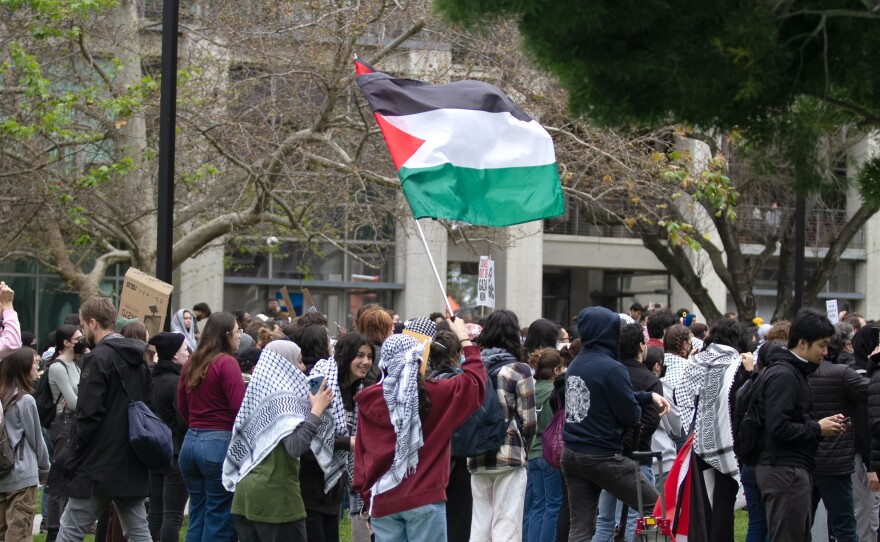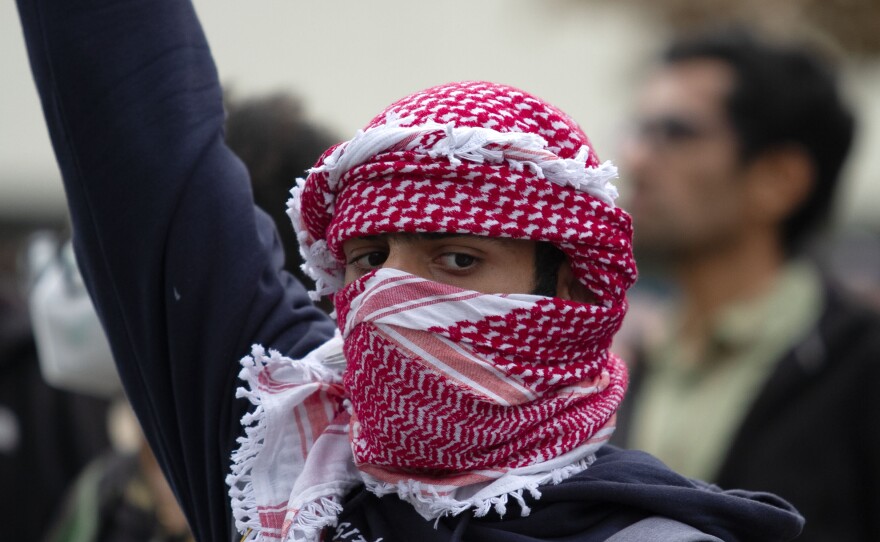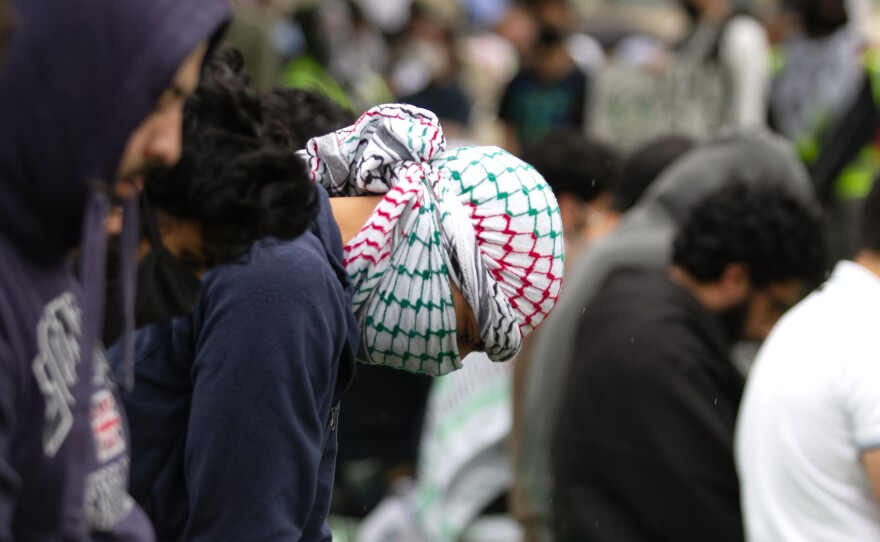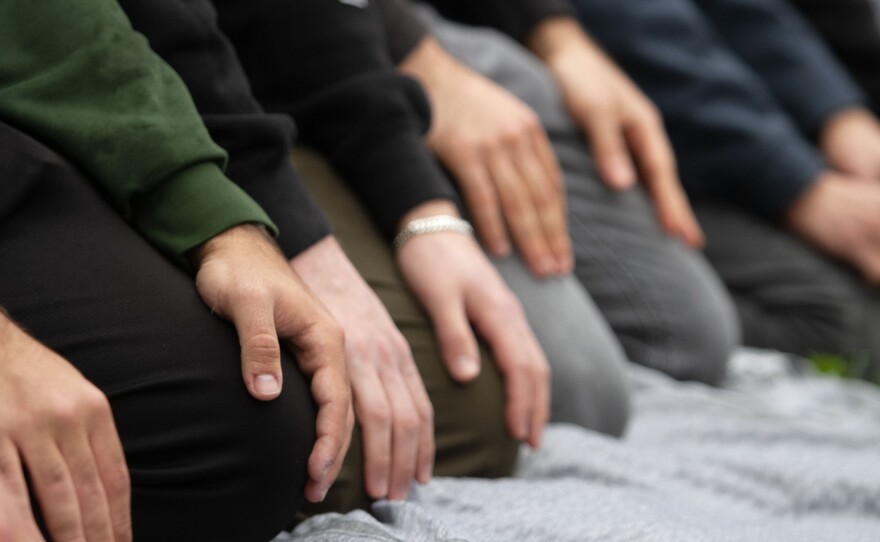College students across California were arrested this year protesting their universities’ investments in assets that support Israel.
In May, UC San Diego campus police arrested 60 student protestors.
Annie Rios is an attorney coordinating their student conduct defense pro bono.
She said most California students have essentially settled with their schools at an informal meeting with their college’s dean — accepted responsibility and showed remorse in exchange for lighter punishment.
UCSD students refused. They’re challenging the charges through the school’s student conduct process, and getting a crash course in legal defense.
Dozens of attorneys and faculty members have stepped in to help them.
"They were ready to steamroll them, thinking that they weren't going to have a community behind them," Rios said.
UCSD responded to interview requests with a written statement.
It supports free speech, but calls the May protest an illegal encampment and safety risk.
It says the camp denied entry to a fire marshal and health inspector, and that "a sword, propane tanks and grill, pepper spray and bear spray, metal and plywood shield, mallets and wooden stakes" were found in the camp.
UCSD declined to comment on individual cases, citing student privacy.
Rios said the San Diego City Attorney’s office reserves the right to prosecute the students on criminal charges for up to a year.
If the students accepted responsibility for the school discipline charges, they could incriminate themselves for the criminal charges.
Rios doesn’t think the school has enough evidence.
"None of it is personal. It's very much a description of group activities. 'The group was on the lawn. The group refused police instructions. The group, the group,’” she said.

If a written report is used against a student, the school has to call a witness to back it.
The student has the right to cross-examine that witness.
In this case, the witness was a campus police officer.
"Honestly, what went through my mind is this is going to be so hard," Rios said. "I don't know who in their right mind would choose this."
Nearly all the students did.
So Rios held cross-examination boot camps, posing hypotheticals to the group.
"'What would happen if the witness said this? How do you do a cross-examination?' (It went) down to me actually showing video clips of 'My Cousin Vinny’ and showing, 'This is a good cross-examination, try and do it like this. This is a bad one. Don’t do this,'" she said.
Max Sklar is one of the students.
They come from a long line of Jewish activists, they said.
The Star of David hangs around their neck between the folds of a keffiyeh, over a shirt that says: "Not in our name. Jews say cease fire now."
They said many Jewish students were at the forefront of the protests, alongside Palestinians, Arabs and others.
"A lot of us recognize that our safety — Jewish safety — and Palestinian liberation are intertwined," they said. "There’s this big idea of, like, the zero-sum game — that in order for one community to prosper, the other one has to fall. And I just think that’s so entirely false.”
Like the rest of the students, the school put a hold on Sklar’s degree.
Fighting the charges would prolong that, but Sklar said they wanted to "stand on business” and hold the school accountable.
"It’s David versus Goliath and it’s a really big giant. But, you know, eventually David won," they said.

Sklar and Rios said the arrest report the school used against the students appeared to be copy-pasted for all of them.
When Sklar appeared at their Zoom hearing, the witness called against them wasn’t the officer who arrested them.
"I had actually never seen this guy, and he had never seen me," they said.
Sklar used the techniques Rios taught them in boot camp to cross-examine the officer.
They got him to admit he hadn’t even read the report, they said, and wasn’t a suitable witness.
"It was one of those, like, 'Gotcha!' moments,” they said.
Lawyers aren’t allowed to speak at student conduct hearings, but they can send messages.
"I am losing my mind," Rios recounted. "I’m like caps-locking to Max: 'I CAN’T BELIEVE YOU JUST GOT THAT!'"
She said Max seamlessly filled time between receiving her guiding messages. They even brought up case law.
"I’ve been practicing now for close to 15 years, and I truly consider this a highlight of my career," Rios said. "I'm extremely humbled and proud to even be in the same space as these students and to see Max defend themselves with such dignity.”
Rios said she was first arrested as a student on the UC Berkeley campus.
"Twenty-something years later, to see the student movement still being alive and the passion and the commitment, I think that really invigorated my sense of what it is to be an activist attorney," she said.
Sklar said flexing the small bit of power they had was exhilarating.
"You’ve made my life for the last couple of months, like, really stressful and you’ve made this experience of graduating into this thing that’s, like, completely twisted," they said of the university. "You can do all these things to me, but I can do this one thing, and kind of show you that people are paying attention."
Rios said one officer’s allegations were false and bizarre — that the students had sharpened bits of wood into spears, that they had urine or chemicals in gallon water jugs, and what she considers "racist" claims that the Black Panther Party of San Diego was teaching the students tactical warfare and chokeholds.
"You’re posing them as more dangerous than what they were for the purpose of having people fear them," she said.
The students again used Rios’s training, asking the officer if he had tested the liquid he assumed was urine. He hadn’t.
The UCSD statement says "the community standards board members who preside over student conduct hearings are empowered to make credibility determinations and may disregard any testimony that they believe to be untrue, whether because the witness is mistaken or because the witness is lying."
About a dozen students have gone through the process so far.

Mounting their own defense, Rios said the students convinced the school to drop many of the charges, but it didn’t seem to matter.
Regardless of which charges they walked in with and which charges stuck, she said, they all walked out with the same punishments: one year academic probation, 15 hours of community service (reduced from 30 after an appeal), and a decision-making course (the $50 course fee was waived.)
The course asks questions like: How did you harm the university?
Sklar thought university leadership should take the decision-making course themselves.
They answered that many students were more harmed by seeing their fellow students being "carted away in cuffs," and that their parents were harmed by not knowing where there child was "for like a good six hours."
Another question asks: How do you think you were influenced by others?
Sklar thought it seemed like the university was trying to get them to snitch on fellow activists.
"I’m not going to lie to them," they said. "I’m not sorry for what I said. I’m not sorry for using my free speech.”
After seeing Sklar’s submitted answers, Rios told the other students not to answer questions that could incriminate them.
If the university decides Sklar’s answers aren’t good enough, they could tell them to redo it.
Students also have the option to do five more hours of community service instead of the course, Sklar said.
They need their degree to apply for grad school.
They want to become a therapist for incarcerated people.
They said the effects of this experience will linger.
“I don’t think I will fully process everything until, you know, everything’s dead and buried,” they said.
Rios agrees.
“There are students who have had suicidal ideation. There are students that weren't able to go home because they didn't know how to tell their parents that they had been arrested and they were too ashamed to return.
"There are students who haven't been able to apply to grad school, haven't been able to get jobs because they can't prove that they've received their bachelor's degree.
"They may have learned collective power and solidarity, but at what cost?" she said.

She’s worried the probation for current students — many of whom are organizers, activists and leaders on campus — will discourage free speech.
"They will want to take part in some form of protest here on campus, but will constantly have to consider the effects of what that's going to do to them with the university. And I think that's done on purpose,” she said.
She anticipates the rest of the hearings could stretch through December.
Hedaia Anayah is another arrested student.
She said including her Palestinian ethnicity on her UCSD application felt like a risk.
That they accepted her knowing she was Palestinian sparked a new sense of belonging in her.
"I was so, like, excited and motivated and able to express a part of me that I've hidden for over 20 years," she said.
Having to prove she’s not a threat to the school soured that for her.
"A lot of us haven’t really processed that we had to do this whole game of like, 'Wait, am I really that bad of a person?' or 'Wait, am I really a criminal?' That’s what gets to you at the end of the day is, like, you start questioning your value as a student," she said.
She said she felt deceived by the way the university platforms diversity, equity and inclusion in promotional materials.
"Most of the students who got arrested were people of color, and we were not given that fair advantage,” she said.
She said she won’t stop calling on the UC to divest from assets that support Israel — $32 billion, including $3.3 billion in weapons manufacturers. It makes up almost one-fifth of the UC system’s entire portfolio.
"My voice will keep coming back," Anayah said, like a "ringtone in Chancellor Khosla’s ears."
This experience cemented her future plans. She wants to become a lawyer, like Rios.
First, she’ll need the school to grant her degree.





